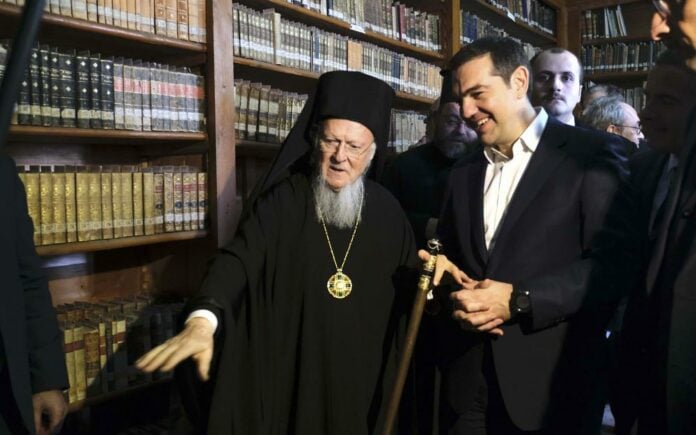Greek Prime Minister Alexis Tsipras referred to the need for a full respect of religious rights on Wednesday, speaking during his tour of the still-closed Christian Orthodox seminary on the Marmara Sea island of Heybeliada (Halki).
Moreover, during the second day of his official two-day visit to Turkey, he emphasized that the reopening of the seminary “cannot be turned into an object or message of conflict, but ranks as a message of friendship, mutual understanding and brotherhood between peoples.”
He was given a guided tour of the seminary by Ecumenical Patriarch Bartholomew I, the “primus inter pares” of the world’s Eastern Orthodox patriarchs.
His statement refers directly to media reports the same day claiming that Turkish President Recep Tayyip Erdogan, during more than two hours of one-on-one talks with him a day earlier in Ankara, linked the reopening of the seminary to a change in the regime governing Muslim muftis in the northeast Greek province of Thrace.
The Halki seminary, for decades the preparatory academy for clergymen serving the Istanbul-based Ecumenical Patriarchate, was abruptly ordered closed by Turkish authorities in 1971.
Athens does not consider the matter as bilateral, but rather as falling within the sphere of internationally recognized religious freedoms.
Conversely, official Ankara wants muftis in Thrace to be elected by members of the Muslim minority in the province’s three prefectures, whereas the Greek government currently appoints the quasi-judicial Muslim officials – similar to the regime employed in Turkey.
After Halki, Tsipras is due to visit the renowned Dolmabahçe Museum in Istanbul, where he will be given a guided tour by former Turkish premier Binali Yildirim, the current president of the country’s grand assembly. Yildirim is expected to resign in the coming period in order to run for Istanbul mayor in the spring election.
Speaking after his earlier visit to the Hagia Sofia in Istanbul, the Greek prime minister later expressed, via Twitter, his joy and sentiment in visiting the site, which he referred to as a monument of Byzantine civilization, Orthodoxy and the world’s cultural heritage. “You feel the weight of history here,” he added.














